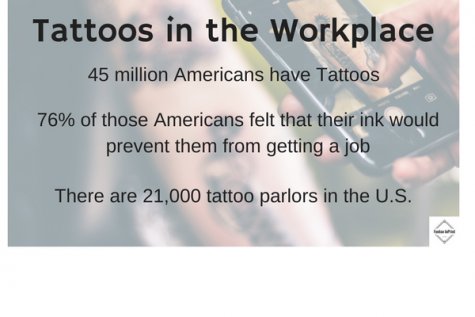Tattoos should not be seen as a negative attribute in the workplace
October 30, 2017
On a 90 degree day, rather than wear a longsleeve shirt, you attempt to cake on makeup to cover the tattoo on your arm that you love so dearly. Or maybe, you opt for the longsleeve in lieu of the makeup sweating off. This is a daily battle for many workers who are prohibited from showing tattoos at their job.
As of 2015, over 45 million americans over the age of 18 have at least one tattoo according to statisticbrain.com. This is over 20 percent of the adult population, 20 percent of workers that have some form of ink on their bodies. With tattoos being so common, it is beyond unfair that they’re expected to be covered in most workplaces.
Tattoos are a form of self expression. They are a way for anyone to show their values or simply decorate their bodies, and this is in no way something they should be ashamed of or have to cover up. Most businesses prohibit workers from showing their tattoos, especially in professional settings, according to pew research center. Research by survey.com said that 76 percent of people felt that visible tattoos would hurt their chances of getting a job that they are otherwise qualified for.
 The idea that something as beautiful as self expression can prevent someone from getting a job is unacceptable. Imagine not getting a job because of your art or writing, or the way you cut your hair. There is no difference in terms of self expression between tattoos and haircuts except for their permanence. A tattoo becomes a part of who someone is when they get it, it becomes a part of the way they look. So imagine not getting a job because of your skin color or face shape, or any other physical attribute. There is no viable reason that the way you look, or the way you express yourself, should affect your chances of getting a job. So why is it that the non-acceptance of tattoos is so well accepted?
The idea that something as beautiful as self expression can prevent someone from getting a job is unacceptable. Imagine not getting a job because of your art or writing, or the way you cut your hair. There is no difference in terms of self expression between tattoos and haircuts except for their permanence. A tattoo becomes a part of who someone is when they get it, it becomes a part of the way they look. So imagine not getting a job because of your skin color or face shape, or any other physical attribute. There is no viable reason that the way you look, or the way you express yourself, should affect your chances of getting a job. So why is it that the non-acceptance of tattoos is so well accepted?
Many people have been standing up to tattoo discrimination, and even piercing discrimination, on social media.
My body may be a temple, but I am the god to whom it is devoted. Do not presume to tell me how I may decorate my altar.
— Unknown
Interestingly, the number of tattooed Americans is larger in the 18-29 age group, closer to 40 percent, according to Pew Research Center. This age group is generally being newly released into the professional workforce, and is experiencing tattoo discrimination for the first time. The personal expression of the ink on their bodies is preventing them from getting certain high-paying jobs.
Many would make the argument that allowing tattoos would ‘open the floodgates’ so to speak; they say that allowing tattoos would allow visible and offensive ink. This idea is simply ridiculous. Just as a manager could censor an obviously inappropriate tee-shirt, a manager could censor an obviously inappropriate tattoo.
However, the root of the issue is not the company. The root of the issue is society’s stigma against tattoos. While tattoos and piercings are becoming more accepted, they’re still widely known as ‘trashy’ or ‘indecent’. The only reason that the hiring manager has a problem with tattoos is that the consumers have a problem with tattoos. That is to say that if society’s stigma against tattoos were to be removed, so would the company’s stigma.








mike warda • Nov 2, 2017 at 7:11 AM
Well done. Speaking as a professional manager and someone who hires I believe the solution lies somewhere in the middle. Nazi symbols, swastikas, current ISIS symbols, civil war slavery symbols, etc. These are all self expression highlighting who you are and would not be allowed by me. I agree with the problem but we must be careful with the solution.